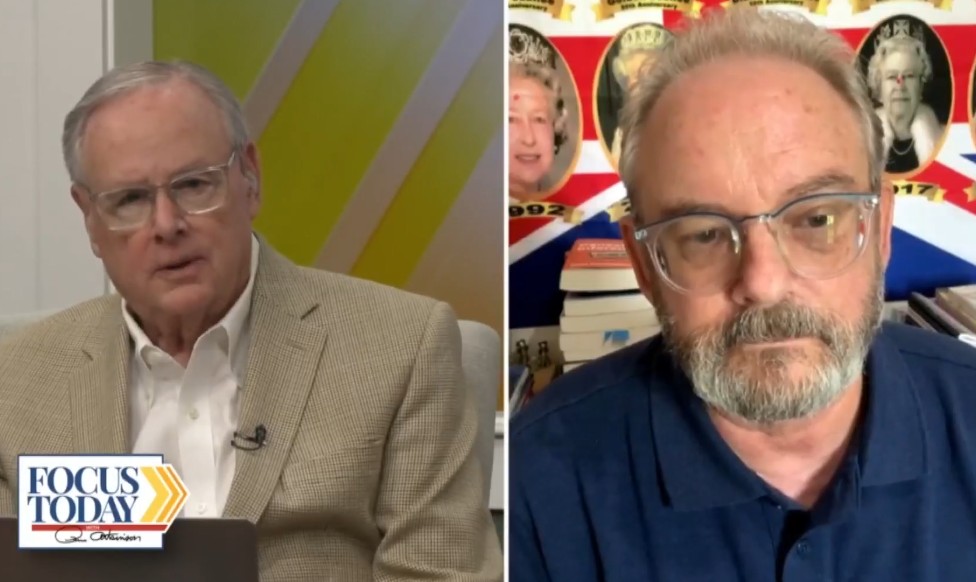Author of Maggie’s Hammer talks Alaska Summit and the Larger Picture with Russia
In his interview with Perry Atkinson on Focus Today for The Dove Network, Geoff Gilson discussed both a pressing geopolitical matter—the Alaska Summit with Russia—and the broader, often unseen forces that shape global politics. Gilson, who brings a unique perspective from his years as a political insider and speechwriter for Margaret Thatcher, used the conversation to connect current events to deeper structural and historical realities that the public rarely hears about.
The discussion began with the Alaska Summit, a meeting between U.S. and Russian officials that carried a charged atmosphere even before it began. Gilson noted that while summits of this kind are often billed as opportunities for diplomacy and bridge-building, they are also moments of intense strategic signaling. He described the event as less about the public agenda—such as talks on arms control, trade, or regional conflicts—and more about the subtle exchanges of posture, language, and leverage. According to Gilson, the optics, tone, and unspoken cues in such meetings can be just as important as the official statements afterward.
Gilson argued that much of the real significance of these meetings lies in what is not said publicly. Behind closed doors, leaders and their teams test each other’s resolve, push their own red lines, and gauge reactions to implicit threats or offers. He suggested that the Alaska Summit was as much about each side defining the other’s strategic boundaries as it was about resolving any immediate disputes. While the headlines would likely focus on tense exchanges or diplomatic snubs, Gilson emphasized that these were part of a carefully orchestrated performance for domestic and international audiences.
From there, the conversation shifted to Gilson’s background and how his insider experience has shaped his worldview. As a former speechwriter for Prime Minister Margaret Thatcher, Gilson had a front-row seat to high-stakes political maneuvering. He explained that crafting speeches for a leader like Thatcher was not merely a literary exercise—it involved understanding policy at the deepest level, anticipating political consequences, and embedding messages that could resonate with multiple audiences simultaneously. He learned that politics is often about managing perception as much as it is about making concrete policy changes.
Focus on the Real Thing
Gilson also shared that being on the inside taught him the importance of recognizing the difference between the public narrative and the private agenda. Leaders may speak about one set of priorities to the public while pursuing entirely different goals behind the scenes. This dual reality, he said, is not necessarily about deception—it is a feature of how governance and diplomacy work in practice, especially when sensitive negotiations are underway.
The discussion broadened into Gilson’s current work, which often involves exploring what he calls the “larger issue behind what many don’t see.” He described this as the complex web of motivations, alliances, rivalries, and long-term strategies that underpin world events. In his view, the public is often left with fragmented or oversimplified explanations, because the deeper realities involve uncomfortable truths about power, compromise, and global interdependence.
Gilson noted that in the case of the Alaska Summit, the hidden layer might involve issues far beyond the immediate U.S.-Russia relationship. Economic interests, covert intelligence operations, and the involvement of third-party nations often influence the tone and outcome of such meetings. Even cultural and historical narratives—how each nation sees itself and its role in the world—can shape negotiations in ways that outsiders overlook.
Drawing on his Thatcher years, Gilson also reflected on how Western leaders often approach diplomacy with authoritarian states. He recalled that Thatcher, while firm in her principles, understood the necessity of strategic engagement. Confrontation in public could be paired with pragmatic negotiation in private, allowing leaders to maintain political strength at home while avoiding unnecessary escalation abroad. This, he suggested, might also be part of the Alaska Summit dynamic, even if it was not visible in press reports.
In closing, Gilson encouraged listeners to maintain a healthy skepticism toward official narratives, not as an act of cynicism but as a way of engaging more deeply with the complexities of international affairs. The Alaska Summit, in his view, was not an isolated diplomatic encounter but part of a much larger tapestry of power relations, hidden motives, and strategic maneuvering.
By weaving his first-hand experience with current events, Gilson provided an insider’s perspective that challenged surface-level interpretations. His message was clear: understanding global politics requires looking beyond what is presented in the headlines and recognizing that the real story often unfolds in the spaces between the public statements and the private negotiations.



